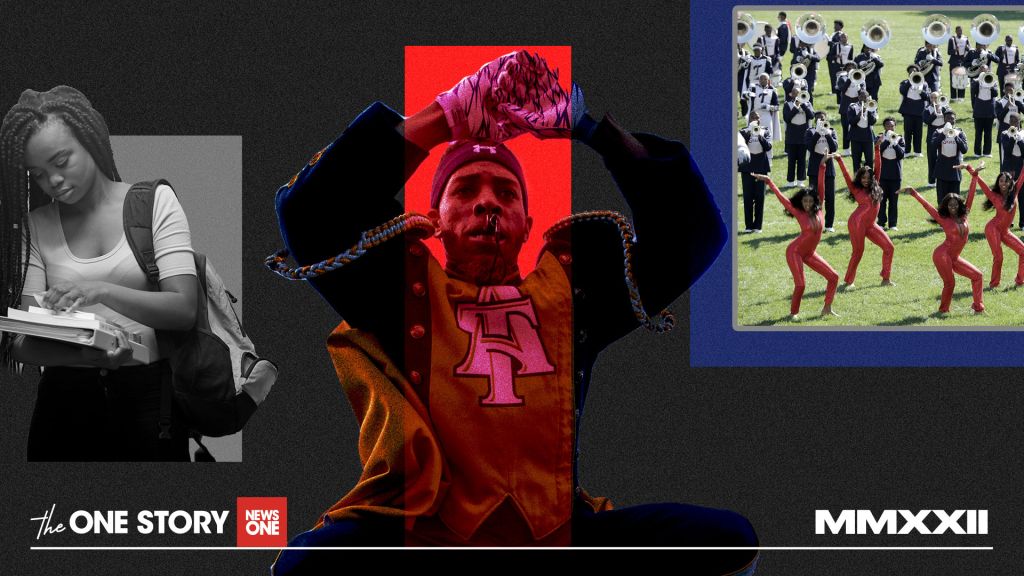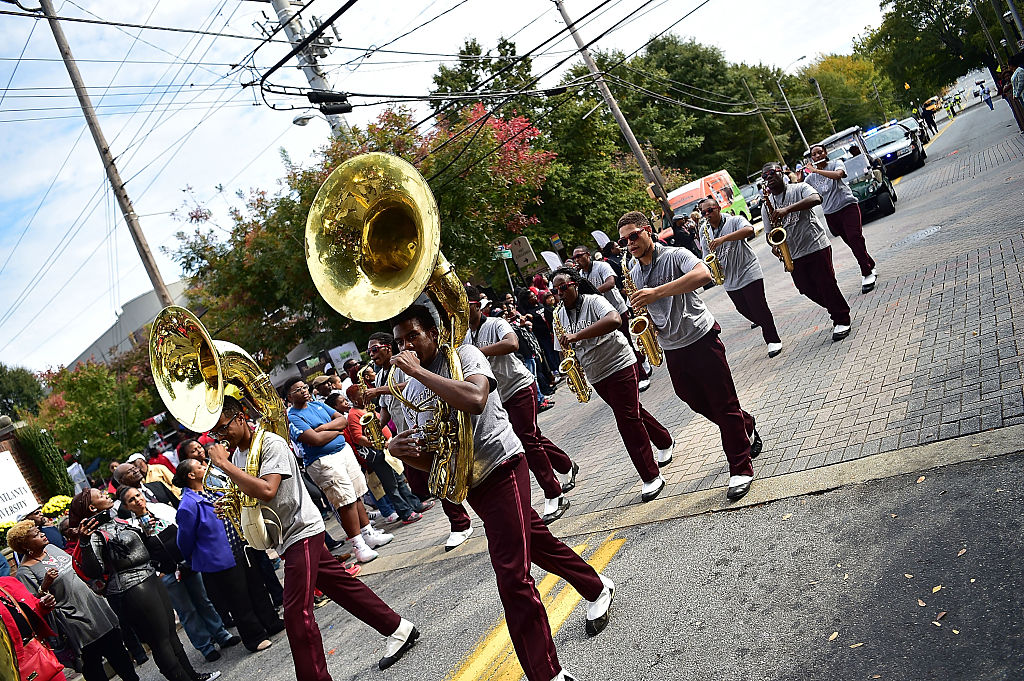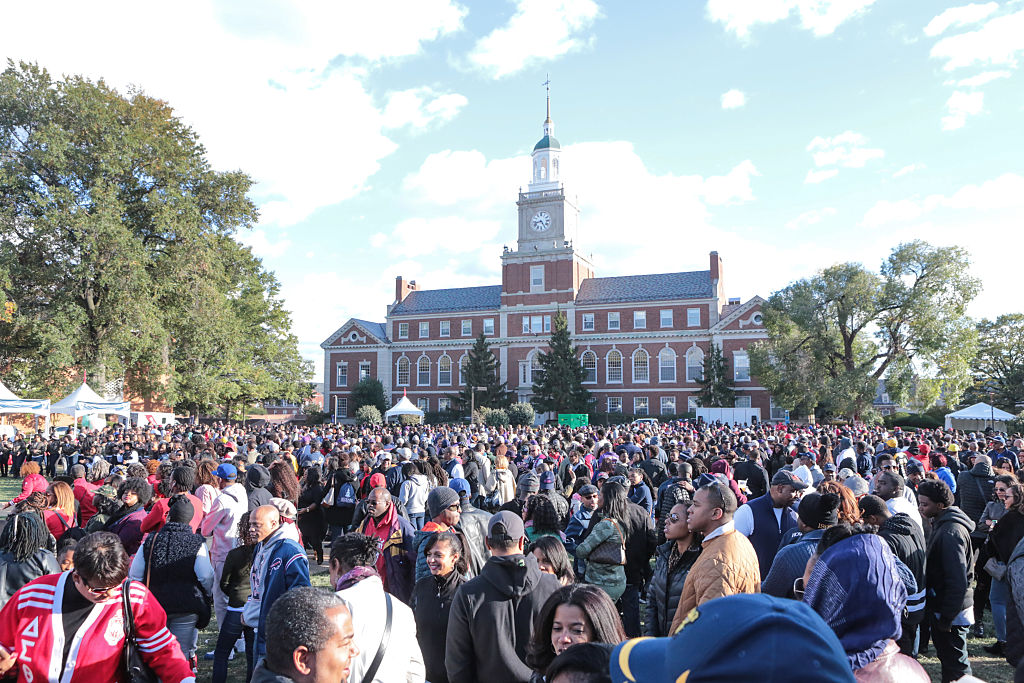HBCU Homecomings: Celebrating The Best Of Black Culture

Source: iOne Creative Services/Getty Images
The common definition of the word “homecoming” is fairly simple: “the return of a group of people usually on a special occasion to a place formerly frequented or regarded as home,” especially “an annual celebration for alumni at a high school, college, or university.”
But at historically Black colleges and universities (HBCUs), that word is anything but common and carries much more weight and a broader connotation while the traditional definition still remains technically accurate.
“HBCU homecomings are more than just football games, tailgates, and parties,” Morgan Harris, North Carolina A&T State alumna and mechanical engineering graduate student at the University of California, Davis said. “It’s a multi-generational community event that reconnects old friends, establishes new ones, and passes down tradition. Without it, we lose touch of what the HBCU community really means.”
Harris’ words ring true in a myriad of ways.
Not only is the annual tradition of HBCU homecomings arguably one of the most important cultural staples in the Black community, but it is one that has been largely absent the past few years, thanks to the COVID-19 pandemic.

A general view of Morehouse, Spelman, and Clark-Atlanta University Homecoming Parade at Morehouse College on October 24, 2015, in Atlanta. | Source: Paras Griffin / Getty
Designated weekends in October and early November typically serve as a time to reconnect, reminisce and rejuvenate by way of HBCU homecomings, the epicenters of Black camaraderie that provide a utopia of Blackness.
“It’s like a family reunion,” Harris added. “When everyone comes to a fully planned reunion, relationships are made stronger, new stories are passed down and new memories are made. Without them, the once tightly knit family slowly becomes strangers.”
This year is extraordinarily special because, for nearly three years, events like homecoming have either been put on hold or scaled back substantially because of COVID-19-related restrictions. This year will be the first real alumni homecoming for many HBCU graduates going as far back as December 2019.
HBCU alumni said the 2022 homecoming season will likely be among the most memorable as people may have taken the annual tradition for granted.
Jarren Smith said he now realizes just how easily these moments can be taken away.
“It’s essential that HBCUs have homecomings back in full swing after these last few years,” Florida A&M University alumnus Jarren Smith, told NewsOne during a recent conversation about all the positives that come from such gatherings. “The community involvement, cultural appreciation, possible enrollment increase, and certainly the economic benefits that come from homecoming are undeniable necessities for HBCUs.”
Current HBCU students are equally as passionate about the resumption of homecomings this year and the expectations of turning campuses into lit environments.
“I’m super excited for this year’s homecoming!” Krysten Henley, a Howard University senior majoring in human performance and minoring in biology, told NewsOne.
Henley said she was especially looking forward to Howard’s renowned YardFest, which features musical performances, student bands and more, as well as participating herself.
“I can’t wait to see who they have picked for this year’s Yard Fest lineup,” Henley continued. “And fingers crossed, I can’t wait to do the homecoming fashion show.”
Make no mistake: Homecoming serves as an outstanding networking opportunity for everybody in attendance, as the pathway to advancement in one’s career could easily be through striking up the right conversation at a tailgate.
However, beyond the fellowship, step shows and football games, homecomings also carry significant economic implications not just for students and alumni but also for the campuses and cities that host these events, an understated prospect when it comes to HBCUs.

On Howard University’s campus in front of the infamous Founders Library Clock Tower, on “The Yard,” alumni, family and friends gather to celebrate Howard’s 93rd annual Homecoming after their football game against North Carolina A&T on Saturday, October 22, 2016, in Washington, DC. | Source: NurPhoto / Getty
For instance, at Jackson State University, tourism officials in Mississippi’s capital city have come to expect a $5 million boost from homecoming weekend. North Carolina A&T’s homecoming – which has been affectionately deemed “G.H.O.E” (Greatest Homecoming On Earth) – generates on average more than $10 million in revenue for the city of Greensboro thanks to the increased number of visitors for that one weekend on the calendar.
Separately, Hampton University’s Homecoming Bazaar invites students, alumni, as well as local businesses, to sell their goods at an event that effectively doubles as an outstanding university fundraiser as businesses secure the coveted, limited number of spots.
Taken in its totality, the HBCU homecoming experience is invaluable on a number of levels as Black colleges continue to play such a vital role in providing joy, fulfillment and opportunities.
“What makes HBCU homecomings special is the deep dive into the culture, the events, the music, the history, etc. all echo Black excellence. Homecoming is the one time of the year where Blackness is celebrated without any apologies,” Smith, the FAMU graduate an account coordinator for the Zimmerman Agency ad firm, emphasized.
“From alumni to current and even future students, homecomings are the best way to appreciate what your HBCUs have done for you and many generations before and what they will do for generations to come.”
SEE ALSO:
A First Timer’s Guide To Surviving An HBCU Homecoming
Here’s 5 Reasons Why I Wish I Had Gone To An HBCU
















